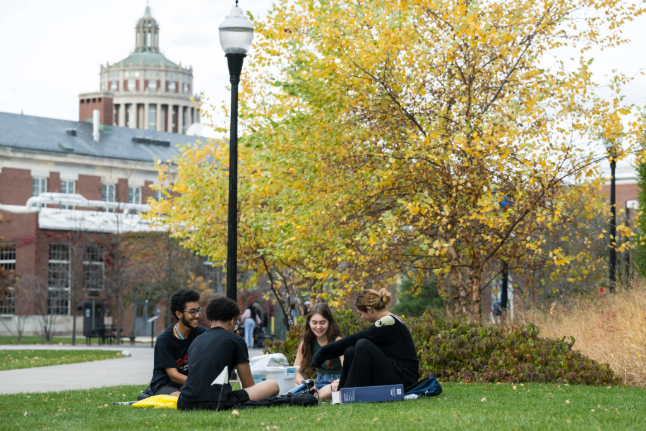Undergraduate Research

The Department of Chemical Engineering has vibrant undergraduate research opportunities. Our research spans from the development of successor technologies to combat climate change, to medical technologies to improve human health outcomes, to optical materials, interface engineering, and the application of artificial intelligence, to chemical engineering processes. Our primary research strengths are:
- Biomedicine and biotechnology
- Catalysis and electrochemistry
- Energy and sustainability
- Micro- and nanosystems
- Polymeric materials
- Simulations and artificial intelligence
All undergraduate students in the Department of Chemical Engineering are guaranteed experience in a research laboratory.
Interested in conducting research with department faculty? Fill out the undergraduate/MS research interest form to get started.
Undergraduate Research Interest Form
Funding
Select funding opportunities to support students taking part in supervised undergraduate research are offered through the Department of Chemical Engineering, the Office of Undergraduate Research, and through external fellowships and awards.
Undergraduate research may be done without funding as an unpaid intern or for academic credit. Independent study courses for academic credit are available during semesters for supervised undergraduate research. Please refer to the ways to participate page for more information about the rules and registration guidelines surrounding unpaid research positions.
Department of Chemical Engineering Funding
Eisenberg Summer Research Fellowship
The Professor Richard F. Eisenberg and Harriet Rippey Eisenberg Fund for undergraduate students and/or programs, offers financial support for selected chemical engineering students for a meaningful summer work experience. Assignments are within the chemical engineering department working closely with faculty on projects that will complement the academic program and enhance the students understanding of the use of chemical engineering principles.
Projects: Interested faculty will submit proposals for summer projects with the commitment to work closely with students, providing advice and guidance. There are a variety of projects available covering different phases of chemical engineering ranging from applied to fundamental problems. Projects may be experimental and/or theoretical in nature. A brief written description of available projects will be provided to interested students.
Eligibility: University of Rochester undergraduate students completing their sophomore or junior year in the chemical engineering program may apply. The selection of students to participate in the fellowship program will be based on consideration of personal characteristics, promise as a chemical engineer, and the matching of applicants to appropriate projects.
Student Responsibilities: The selected students must make a commitment for full time work over the period of the appointment. An undergraduate research symposium is planned for late-September (or early October) during Meliora Weekend of each year and the student is required to present a poster. Students are also expected to present their research at the AIChE Annual Conference.
Term: 10 weeks during the summer. Other arrangements may be negotiable under special circumstances. 2026 Remuneration: $6,000
Additonal information: Project topics posted early January each year; applications are due on March 1. For more details, contact Jennifer Condit by email at jennifer.condit@rochester.edu.
Paid Research Positions
If you are in search of a paid research position, use the links below to help begin your search:
- JobLink - University of Rochester's on-campus student employment job board
- Handshake - internships and networking/connections on- and off-campus, though not all postings may be paid opportunities
- Summer research page - searchable databases and selected links for competitive, structured research opportunities
- Department of History HOUR program - apply to assist members of the history faculty who would like help on their research projects. Compensation can be an hourly assistantship wage or credit for HIS 395.
Publications Resulting from Undergraduate Research
Current and former undergraduate students and years are bolded.
Wilsey, M. K.; Cox, C. P.; Forsythe, R. C.; McCarney, L. R.; Müller, A. M. Selective CO2 reduction towards a single upgraded product: a minireview on multi-elemental copper-free electrocatalysts. Catalysis Science & Technology 2021,11, 416-424. Editor's Choice!
Juneau, M.; Pope, C.; Liu, R.; Porosoff, M. D., Support acidity as a descriptor for reverse water gas shift over Mo2C-based catalysts. Applied Catalysis A: General 2021, 620, 118034.
Krajovic, M. Anthamatten, Melt-Recyclable Shape-Memory Elastomers Containing Bisurea Segments. ACS Applied Polymer Materials, 2021, 3 (4), 2082-2087.
Juneau, M.; Vonglis, M.; Hartvigsen, J.; Frost, L.; Bayerl, D.; Dixit, M.; Mpourmpakis, G.; Morse, J. R.; Baldwin, J. W.; Willauer, H. D.; Porosoff, M. D., Assessing the viability of KMo2C for reverse water–gas shift scale-up: Molecular to laboratory to pilot scale. Energy &Environmental Science 2020, 13 (8), 2524-2539.
Gandhi H.A.; Jakymiw S.; Barrett R.; Mahaseth H.; White A. D., Simview VR: Real-time Simulation and Visualization of Organic Molecules. Journal of Chemical Education 2020,97 (11), 4189-4195.
Chakraborty M.; Xu J.; White A. D.; Is Preservation of Symmetry Necessary for Coarse-Graining?Physical Chemistry Chemical Physics 2020,22 (26), 14998-15005.
Makuc, E. H. Chimowitz, Process Waste Heat with a Supercritical Carnot Engine. engrXiv Preprints, DOI: 10.31224/osf.io/qrgtz, 2020.
